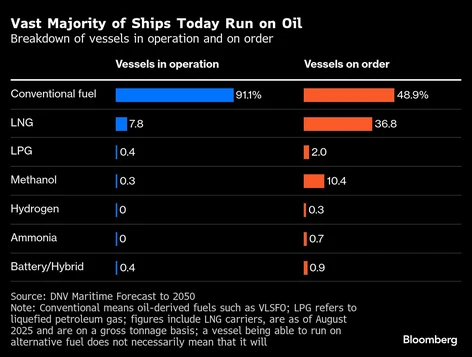The maritime industry accounts for over four-fifths of the world’s trade and more than one per cent of all emissions
By Jack Wittels

The world’s shipping regulator postponed a decision on adopting a landmark charge on vessel emissions, a shock move that highlights the Trump administration’s efforts to disrupt international climate diplomacy.
The postponement marks a setback for multilateral environmental regulations ahead of next month’s COP30 climate summit in Brazil.
Countries gathered at the International Maritime Organization’s London headquarters this week to decide on whether to make ships start paying for the more than 1 billion tons of greenhouse gases they emit each year. On Friday, they voted to push back that ballot for a year, following a proposal put forward by Saudi Arabia.
Industry insiders had previously expected the rules to pass, despite United States pressure. They’ve been years in the making, and would be the world’s first global, fixed charge on emissions for any industry. They would also pave the way for the end of oil as shipping’s dominant fuel and opened the door for cleaner alternatives like ammonia.
While the plan had clear international support back in April, that wavered this week as the U.S. dialed up pressure, threatening wide-ranging measures against those who backed the planned rules that President Donald Trump on Thursday said he was “outraged” about.
The International Chamber of Shipping, representing over 80 per cent of the world’s fleet, said it was disappointed with the result, and that uncertainty over the plan’s future threatens investments needed to make the sector cleaner.
US Pressure
The decision’s delay demonstrates the effect that pressure from the Trump administration can have. The U.S. strongly opposed the ship emissions charges, calling them a “global carbon tax” on Americans and warning of “disastrous” economic impacts. It had urged other nations to reject the regulations from “an unaccountable UN organization,” saying some estimates had forecast shipping costs to jump as much as 10 per cent or more.
The State Department had said it would consider measures such as port levies, visa restrictions, commercial penalties and sanctions on officials. It also previously mentioned tariffs as part of potential responses, though it became unclear if they remained on the table.
Trump said the U.S. wouldn’t adhere to the carbon tax “in any way, shape, or form,” and that he was “outraged” that the IMO was holding a vote.

The U.S. also put pressure on the plans this week by asking for another step in adopting the charge if countries voted in favour of it — proposing nations explicitly opt in after the vote in a shift from a “tacit acceptance” process. That would effectively add a further hurdle for them coming into force.
There were signs of wavering this week. Bloomberg reported Thursday that Athens, which had long been skeptical about the plan because of the impact on its maritime industry, was considering abstaining.
On Friday, Singapore — previously a supporter of the plan — proposed that nations delay voting on the charge. That was backed by Saudi Arabia, which was already against the rule.
Climate Impact
The plan’s failure is another example of the challenges that international climate diplomacy and regulation face. The Trump administration has been dismantling its domestic climate policy and attempting to disrupt efforts to cut emissions globally. Companies have also ditched climate commitments over the past year as the reality of meeting ambitious time frames becomes clear and the marketing benefits of having green credentials fade.
Though Trump has pulled the U.S. out of the Paris climate agreement, the withdrawal only takes formal effect in 2026. In practice, the U.S. will still be able to block efforts to reach consensus at the COP30 talks in November.
The maritime industry accounts for over four-fifths of the world’s trade and more than one per cent of all emissions, and the carbon levy was a key part of the IMO’s push for international shipping to reach net zero by around mid-century.
That goal now looks more difficult to achieve.
“We are disappointed that member states have not been able to agree a way forward at this meeting,” International Chamber of Shipping Secretary General Thomas Kazakos said in a statement. “Industry needs clarity to be able to make the investments needed to decarbonize the maritime sector, in line with the goals set out in the IMO GHG strategy.”
Bloomberg.com
Share This:




 CDN NEWS |
CDN NEWS |  US NEWS
US NEWS 
























